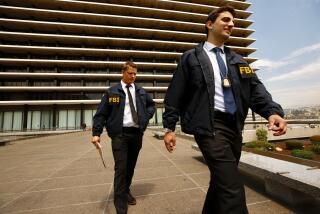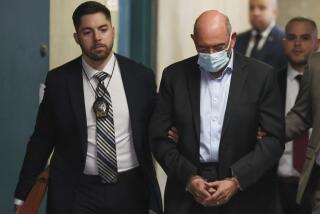Ex-KPMG auditor Scott London is charged
Prosecutors filed a criminal charge against disgraced former KPMG partner Scott London, saying he gave a stock-trading friend inside information about his firm’s clients in exchange for cash, jewelry and expensive dinners.
The criminal case filed Thursday in federal court in Los Angeles conflicted with the version a contrite London gave reporters earlier this week; London said that the information he gave his buddy was sparse and that his involvement in the stock trades was minimal.
Prosecutors, however, said in court papers that London was intimately involved in the illegal trades made by his golfing pal, Bryan Shaw, an Encino jeweler.
Criminal complaint filed against Scott London
London, who worked in KPMG’s Los Angeles office, told Shaw when to buy, when to sell and how to attract the least attention while reaping huge profits, prosecutors said. They cited dozens of telephone calls between the two men in the days before market-moving news.
The accountant also read Shaw financial news releases days before they were made public, prosecutors said. He allegedly told Shaw about acquisitions involving KPMG clients, giving Shaw an edge that helped him generate more than $1.2 million in profits. At least five companies allegedly were involved, including Herbalife Ltd., a Los Angeles nutritional products company, and Skechers USA Inc., a Manhattan Beach footwear company.
After Shaw sold shares for a profit, he’d meet London on a quiet San Fernando Valley street and hand him cash: $100 bills in $10,000 bundles, the criminal complaint said.
“London would usually remark that Shaw was too generous and did not have to pay him for the information, but London always took the cash,” prosecutors said in the criminal complaint.
In an interview with The Times earlier this week, London said he might have accepted $25,000. The Securities and Exchange Commission, in a regulatory lawsuit filed Thursday, put the number at close to $50,000.
On top of that, London accepted a $12,000 Rolex watch from Shaw, prosecutors said. Shaw told law enforcement officials that he probably spent $25,000 to $45,000 on tickets to rock concerts — including one by Bruce Springsteen — that he and London attended.
Federal prosecutors charged London with one count of conspiracy to commit securities fraud through insider trading. The charge carries a possible sentence of five years in prison. London made a brief appearance in federal court Thursday and was released on $150,000 bond.
The Agoura Hills resident intends to plead guilty next month, defense attorney Harland Braun said. He said London still can’t explain why he violated his clients’ trust for money that he didn’t need.
“It’s just inexplicable,” Braun said. “I’m sure somewhere deep in his psyche, someone might be able to explain it, because things don’t happen without a cause.”
Andre Birotte, the U.S. attorney for Los Angeles, said it’s important for the government to go after insider-trading cases to keep the financial markets on an even playing field.
“He was an auditor at a company that was entrusted to protect the information of respected companies,” Birotte said. “To take that information and provide it to at least one other individual for profit feeds into that perception that the markets are tilted and only for those who are privileged and have inside information.”
As the partner in charge of audits in Los Angeles, London supervised hundreds of accountants. He had access to financial secrets of dozens of publicly traded companies, secrets that he and KPMG were obligated to keep quiet.
London started to violate that trust in 2010, when he gave Shaw advance word about Herbalife’s earnings and acquisitions of KPMG clients, prosecutors said.
Shaw snapped up thousands of Herbalife shares in the weeks before a May 2011 announcement of the company’s record sales, prosecutors said. The news drove Herbalife shares up 13%. Shaw sold in the days to follow, netting about $450,000 in profit.
In February 2012, London told Shaw that KPMG client Pacific Capital Bancorp was about to be acquired by Union Bank, prosecutors said. Pacific Capital’s shares soared 57% when the news was announced in March 2012. Shaw made $365,000.
A few months later, Shaw told London he was worried because Fidelity Investments had put a hold on his brokerage account — a sign the firm might have detected the insider trading. London told him not to worry, according to prosecutors.
“London reassured him that there was no reason for concern and explained that insider trading was like counting cards in Las Vegas: If you were caught, they simply ask you to leave because they cannot prove it,” the criminal complaint said.
Shaw later admitted the illegal trades to FBI agents, according to the U.S. attorney’s office. He then agreed to work with the FBI to build a case against London, probably earning leniency in the process.
Agents checked telephone records, which confirmed Shaw and London spoke dozens of times ahead of big stock purchases. They instructed Shaw to secretly record conversations with London.
In one call in February 2013, London told Shaw that Herbalife’s sales numbers for the fourth quarter of 2012 were going to beat estimates. London also told Shaw in the recorded call that he would get inside word if the company went private, a move that would drive up its stock price.
“That is where you’re going to make a ton of money because, you know, we’ll know that” before the public does, London said.
At the FBI’s direction, Shaw met London twice, handing him $5,000 cash each time. Agents photographed London accepting a $5,000 payment from Shaw outside a Starbucks in Woodland Hills.
The contrast between the new details and London’s earlier portrayal of himself could end up hurting him, one legal expert said.
“That may backfire because of the type of information that’s coming out now,” said Michael Weinstein, a former federal prosecutor who is now a defense lawyer in New York and New Jersey.
In its aggressive campaign to root out insider trading, the government has come down harder on people who leak confidential information, rather than those who illegally profit from tips they receive, legal experts said. London had a duty as an auditor to hold public companies’ secrets, not profit from them, Weinstein said.
“This does not appear to be just one isolated lapse of judgment,” Weinstein said. “This is repeated conduct.”
Shaw may be treated more favorably, Weinstein said. “He’s not the one that peddled the inside information — he just took advantage of it,” Weinstein said.
Given Shaw’s cooperation, he stands to get more favorable treatment by prosecutors, assuming they charge him in the alleged scheme. “The leverage he has is giving up London,” Weinstein said. “He may have played that already.”
The government could file more charges against London if it seeks a grand jury’s indictment, increasing pressure on him, Weinstein said.
And if London has any leverage, it could be his cooperation against any other co-conspirators — though the authorities have not named any. If London can’t deliver anyone else, he may have a weak hand, experts said.
“It’s a one-off,” Weinstein said. “If he’s already given up everything, the government doesn’t need him.”
Times staff writers Ricardo Lopez, Shan Li, Thomas Suh Lauder and Ken Bensinger contributed to this report.







